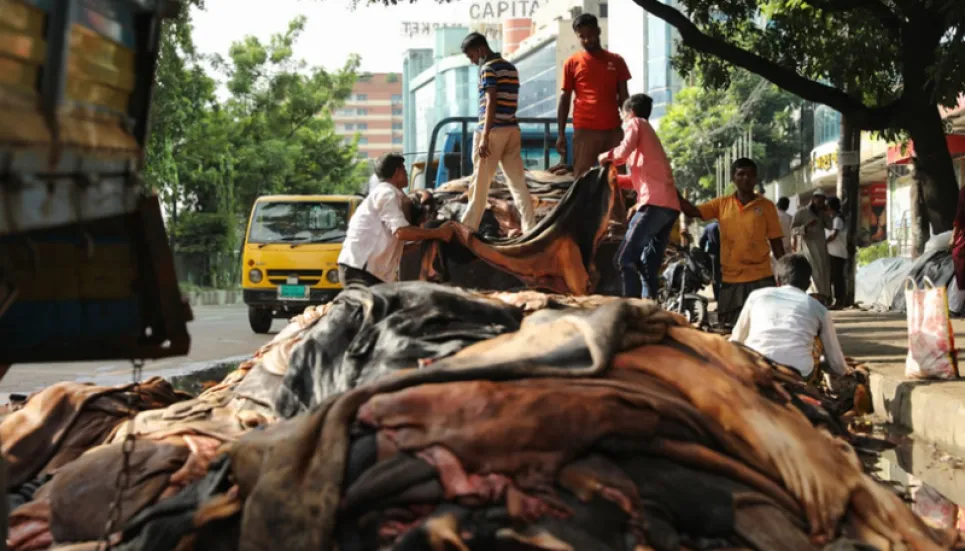Home ›› 24 Jul 2021 ›› Front

Better prices, favourable government policies and awareness campaigns helped cut rawhide wastage during Eid-ul-Azha this year.
Industry insiders say permission to export semi-processed leather, the government’s campaign for skin preservation, a rise in rawhide prices and increased leather goods export together helped bring down the wastage.
The government permitted export of 10 million square feet (sqft) of wet blue leather this year.
“Export permission of rawhide and our advocacy to preserve skins until getting fair prices played important roles in reducing wastage,” Rawnak Mahmud, secretary of the Ministry of Fisheries and Livestock, told The Business Post.
Rawhides can be preserved for 15 days by applying salt. Once salt is applied for a second time, the hide can be preserved for three months.
“This year, we received no news of wastage of raw hide,” Mahmud claimed.
The Business Post found that a small quantity of rawhide was left wasted in some parts of Dhaka due to lack of seasonal traders and preservation. However, the quantity was smaller compared to previous years.
Preserving rawhide to get fair prices
The Ministry of Industries opened a control room for rawhide traders to advise them on skin preservation. Besides, the ministry circulated leaflets advising preservation of rawhide and not to sell it at unfair prices.
“We are advising everyone not to sell rawhide at unfair prices as it is preservable,” said Mir Md Shahinul Islam from the control room.
Until Friday morning, around 1,300 trucks full of rawhides entered the Tannery Palli at Savar, he said.
Export permission
The permission for wet blue leather export will be valid up to June 30 next year.
“Firstly, the export volume of leather and leather goods increased last year which created demand for rawhide. Secondly, local preservation increased this year,” said Md Mizanur Rahman, vice-chairman of Bangladesh Tanners Association (BTA).
“And then there’s export permission. These three things helped cut rawhide wastage,” he noted.
Rawhide prices rise
Md Tipu Sultan, secretary general of Bangladesh Hide and Skin Merchants Association, said that they bought rawhide from traders at prices fixed by the government.
“We hope tanners will pay us fair prices. The wastage is very low this year according to information we’ve received so far,” he said.
Sultan said they would not sell rawhide if they do not get fair prices. “We are in no hurry as rawhide can be preserved for up to three months. So, chances of wastage are low,” he added.
This year, the government fixed prices of salt-applied rawhide of cows at Tk 40-45 per sqft in Dhaka, up from Tk 35-40. Outside the capital, it is between Tk 33 and Tk 37 per sqft, up from Tk 28-32 last year.
The prices of salt-applied rawhide of goat were fixed at Tk 14-17 per sqft, up from Tk 13-15 during last Eid. The price of female goat skin was set at Tk 12-14 per sqft, up from Tk 10-12.
Although the government fixed prices of rawhide preserved using salt, the prices of skin without salt were not fixed. And, in some areas, nobody showed interest to buy goatskin in Dhaka, The Business Post found.
Traders at Dhaka’s Posta said that they had to pay Tk 100 to Tk 150 more per piece of rawhide based on size and quality compared to last year.
Maulana Shah Alam, a trader at Posta, said they bought per square feet of rawhide without salt for Tk 28-30. The prices increased to Tk 40 after applying salt.
Traders incur losses
Some traders said that they were not getting fair prices and feared that they would have to incur losses this season.
“I had to sell rawhides at a cheaper rate compared to the prices set by the government,” said Ali Azam, a seasonal trader.
In Bogura, seasonal traders dumped rawhide after failing to get fair prices. Bogura municipality removed at least 10 truckloads of dumped rawhide until Thursday afternoon.
Nur Alam, a seasonal rawhide trader from Bogura, said he would incur losses worth Tk 1 lakh this year. “I bought goatskin worth Tk 30,000 and fear that I won’t get fair prices.”